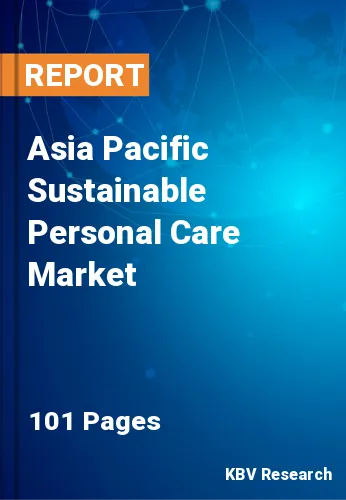The Asia Pacific Sustainable Personal Care Market would witness market growth of 10.1% CAGR during the forecast period (2022-2028).
As public awareness of environmental issues grows, many cosmetic companies are looking for more natural as well as environmentally friendly emulsifiers and chemicals to use in their products. The advantages of sustainable personal care products go further than fashion. In addition, more research are revealing the toxicity of traditional personal care goods, due to which, the sustainable personal care market is increasingly expanding. Manufacturers interested in entering the sustainable personal care market must understand the intricacies of the sustainability movement, including the advantages of going green.
In the beauty and cosmetics sector, there is a spike in consumer interest in sustainability. Moreover, over the past few years, there has been a significant increase in disposable incomes, which has been bolstered by the expansion of global economies, rapidly-evolving lifestyles, and rising demand for sustainable personal care products due to varying climates, all of which have aided the growth of the sustainable personal care market.
India has numerous environmental issues as a result of its substantial chemical use. Growth spurts, like those seen in India, have wreaked havoc on the system, resulting in a slew of anomalies. Environmental toxins, on the other hand, have had an impact on more than only the atmosphere. The health risks related to the usage of non-green artificial items that react with the skin are becoming more well recognized. This has resulted in a slew of skin and hair problems. People have realized the importance of being natural and organic as a result of the significant change in the environment. Existing customers' opinions have shifted dramatically in response to changes in the business climate.
As the country's population becomes more educated and urbanized, people are becoming more aware of the negative consequences of chemicals and synthetic compounds, such as parabens, phthalates, propylene glycol, and formaldehyde, used in sustainable personal care products. Furthermore, India's GDP has been steadily increasing over the years, resulting in higher per capita income, allowing people to spend more on lifestyle items.
The China market dominated the Asia Pacific Sustainable Personal Care Market by Country in 2021, and would continue to be a dominant market till 2028; thereby, achieving a market value of $7,918.3 million by 2028. The Japan market is anticipated to grow at a CAGR of 9.4% during (2022 - 2028). Additionally, The India market would showcase a CAGR of 10.8% during (2022 - 2028).
Based on Nature, the market is segmented into Organic and Natural & Green. Based on Sales Channel, the market is segmented into Hypermarkets & Supermarkets, Online Retail, Specialty Stores, and Others. Based on Type, the market is segmented into Skin Care, Hair Care, Oral Care, Hygiene Products, and Others. Based on countries, the market is segmented into China, Japan, India, South Korea, Singapore, Malaysia, and Rest of Asia Pacific.
Free Valuable Insights: The Worldwide Sustainable Personal Care Market is Projected to reach USD 93.8 Billion by 2028, at a CAGR of 9.4%
The market research report covers the analysis of key stake holders of the market. Key companies profiled in the report include L'Oreal Group, Johnson & Johnson, The Procter and Gamble Company, Unilever PLC, Kao Corporation, The Colgate-Palmolive Company, Estee Lauder Companies, Inc., Coty, Inc., L'OCCITANE Group, and Weleda AG.
By Nature
By Sales Channel
By Type
By Country
Our team of dedicated experts can provide you with attractive expansion opportunities for your business.

